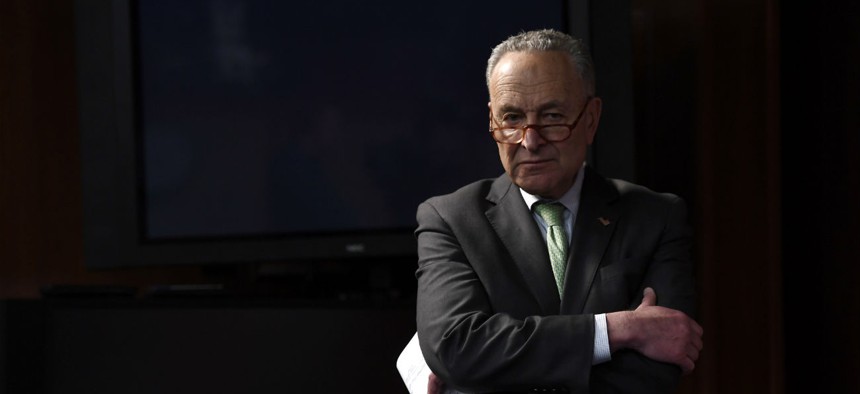Federal Workers, Dems Push for Hazard Pay in Next Coronavirus Legislation
House lawmakers and unions want feds to receive extra compensation if their job puts them at risk of exposure to COVID-19, but the provision was not included in the $2 trillion relief package approved by the Senate Wednesday night.
Federal workers and Democratic lawmakers vowed to continue to fight to secure hazardous pay incentives for employees whose work could expose them to the coronavirus, despite the fact that the Senate declined to include the measure in the $2 trillion stimulus package passed Wednesday night.
After public urging from multiple federal employee unions, House leaders included a provision in their own version of the stimulus bill that would make federal workers who directly treat individuals diagnosed with COVID-19 or those with “frequent, unavoidable contact” with the public, like Transportation Security Administration screeners and some Customs and Border Protection employees, eligible for hazard pay.
But the bill, negotiated among lawmakers and the White House and approved by the Senate by a 96-0 vote late Wednesday, ultimately did not include any provisions guaranteeing hazard pay. The House is expected to approve the bill quickly on Friday, although there are concerns that a few conservatives could delay a vote.
Federal employee unions lauded the Senate’s inclusion of other workforce provisions, like funds to increase agencies’ telework capacity, expand office space to accommodate social distancing and deep cleaning of federal facilities. But they said they would continue to press for the authorization of hazard pay for feds who interact with people who may have coronavirus.
“NTEU understands that federal agencies cannot just close their doors, so it is essential that the government do everything possible to protect those employees who are protecting us all,” said National Treasury Employees Union National President Tony Reardon.
Reardon specifically called on Congress to include funding for hazardous duty pay for CBP personnel at ports and other federal workers at greater risk of exposure to COVID-19 in a so-called Phase 4 coronavirus response bill, which observers anticipate will be up for consideration sometime next month.
American Federation of Government Employees National President Everett Kelley echoed the sentiment that while the bill is an important step forward, more must be done to protect feds.
“This bill falls short in several ways—particularly when it comes to protecting federal workers who risk daily exposure to the coronavirus,” Kelley said. “Provisions left out of the bill would have provided hazard duty pay for front-line federal workers, mandated telework across federal agencies, allowed federal employees unable to work to use weather and safety leave, removed barriers for confirming cases of COVID-19 among federal workers, and nullified three anti-worker executive orders that have prevented federal unions from providing input and guidance into agency decisions affecting workers’ health and safety. We look forward to working with Congress in the near-term to address these unresolved issues.”
In the meantime, some lawmakers are urging the Trump administration to address the hazard pay issue administratively. On Tuesday, Sen. Chuck Schumer and Rep. Brian Higgins, D-N.Y., called on Homeland Security Secretary Chad Wolf to authorize hazard pay for CBP officers.
“CBP officers risk their own health, and the health of their families, to continue serving their country during a global pandemic, and they deserve better,” Schumer said. “These officers are essential to the security of the U.S. and have shown up to serve, even in the midst of a crisis. They deserve better pay in these circumstances, especially because they come into such close contact with cross-border traffic on a daily basis.”
NEXT STORY: How (Not) to Manage Your TSP During a Pandemic




